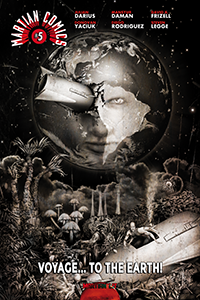 In this third and final installment of our discussion with Martian Comics creator and Sequart Organization founder Julian Darius, we discuss characters’ vs. readers’ vs. believers’ perspectives on Jesus and Paul, as well as the future of his series and any relationship it might have to real-world religions dealing with extraterrestrials.
In this third and final installment of our discussion with Martian Comics creator and Sequart Organization founder Julian Darius, we discuss characters’ vs. readers’ vs. believers’ perspectives on Jesus and Paul, as well as the future of his series and any relationship it might have to real-world religions dealing with extraterrestrials.
S&S: I wonder: Of all the stories in this issue, “What Has Athens to Do with Jerusalem?” features the titular Martians the least, perhaps only in reference to the Athenians “Unknown god […] a placeholder the Athenians use, knowing their knowledge of the gods to be limited.” Do readers know from “Ezekiel” (and “The Galilean” and “Lazarus”) what it is the Athenians don’t, namely that aliens have had an influence in the spiritual affairs of humankind? Is this the manner of answer that Lazarus is seeking?
JD: I love that you saw a connection between the Unknown God and the Martians. That’s not my own primary reading, but it’s there. It follows, once you connect this story with “Ezekiel” — the Martians are, in a sense, an unknown god to the Greeks. And you’re right that they don’t know about Martians, any more than the ancient Jews did. There are other Martian stories to come that kind of play with this same sort of thing, in which humans sort of realize there are forces or divinities out there, beyond their ability to understand. So that’s definitely there, and you’re smart to pick up on it, but to me, that’s a layer, rather than the primary meaning.
Paul cites the “Unknown God” in Acts. There’s a historical dispute as to whether it really existed or not, or to what extent. Was there a temple to the Unknown God? Was there a statue or monument? From what I’ve read, some think yes, some think no. If I remember correctly, Paul only mentions an inscription to the Unknown God, and there’s some ambiguity about what he’s referring to. But it’s a wonderful concept, this polytheistic statement of humility. I suppose you could see it as a parody of polytheism — “We hope we didn’t leave anyone out!” And it is that. But it’s also this wonderful admission, by the smartest city around, that yeah, we don’t know anything. Here’s a monument to that idea. Wow.
I was always fascinated by the Unknown God. As a kid, I thought it was funny that Paul said he was going to tell people about it, because this frames his god in the context of Greek polytheism. Saying that, you’re essentially saying that you’re going to add a god to the Greek pantheon. You can’t say this and then preach monotheism, really. It’s at least very disingenuous. It wasn’t until studying Greek history in college that I began really appreciating the humility of the concept and how it fit into the Greek philosophical outlook. So I love the Unknown God concept and this story from Acts, and I included it on that basis. It illustrates more the difference between Paul’s arrogant “you’re ignorant!” preaching and the nuances of Athenian philosophy.
But yeah, you’re totally right: you can look at the Unknown God and think, “Yeah, they don’t know about the Martians, who played the role of God to Ezekiel.” And who were behind Jesus in the series. Continue reading The Martian Chronicles of Julian Darius, Part III →
 Jason Aaron’s The Goddamned is best described as a cross between the Bible and Mad Max, with all the brutality and wit that implies. But somehow it goes so far into the depths of inhumanity that it crosses over into being funny, and even joyful. There’s the spirit of a dare about the whole book, as if the creators are just pushing their imaginations as far as they can be pushed, well beyond the realm of bad taste. For example , an early scene in issue #3 features a flashback to just after Adam and Eve are expelled from the Garden of Eden, and Eve spits out the charming line, “Fuck you. The snake was more man than you are, you dickless coward.” Adam, serene and buff, simply cradles Cain in his hands and points out that the whole world is his for the taking. And what a world it is.
Jason Aaron’s The Goddamned is best described as a cross between the Bible and Mad Max, with all the brutality and wit that implies. But somehow it goes so far into the depths of inhumanity that it crosses over into being funny, and even joyful. There’s the spirit of a dare about the whole book, as if the creators are just pushing their imaginations as far as they can be pushed, well beyond the realm of bad taste. For example , an early scene in issue #3 features a flashback to just after Adam and Eve are expelled from the Garden of Eden, and Eve spits out the charming line, “Fuck you. The snake was more man than you are, you dickless coward.” Adam, serene and buff, simply cradles Cain in his hands and points out that the whole world is his for the taking. And what a world it is.
 WUSTL’s “Hold That Thought” podcast
WUSTL’s “Hold That Thought” podcast
 In this third and final installment of
In this third and final installment of  Last week,
Last week, 